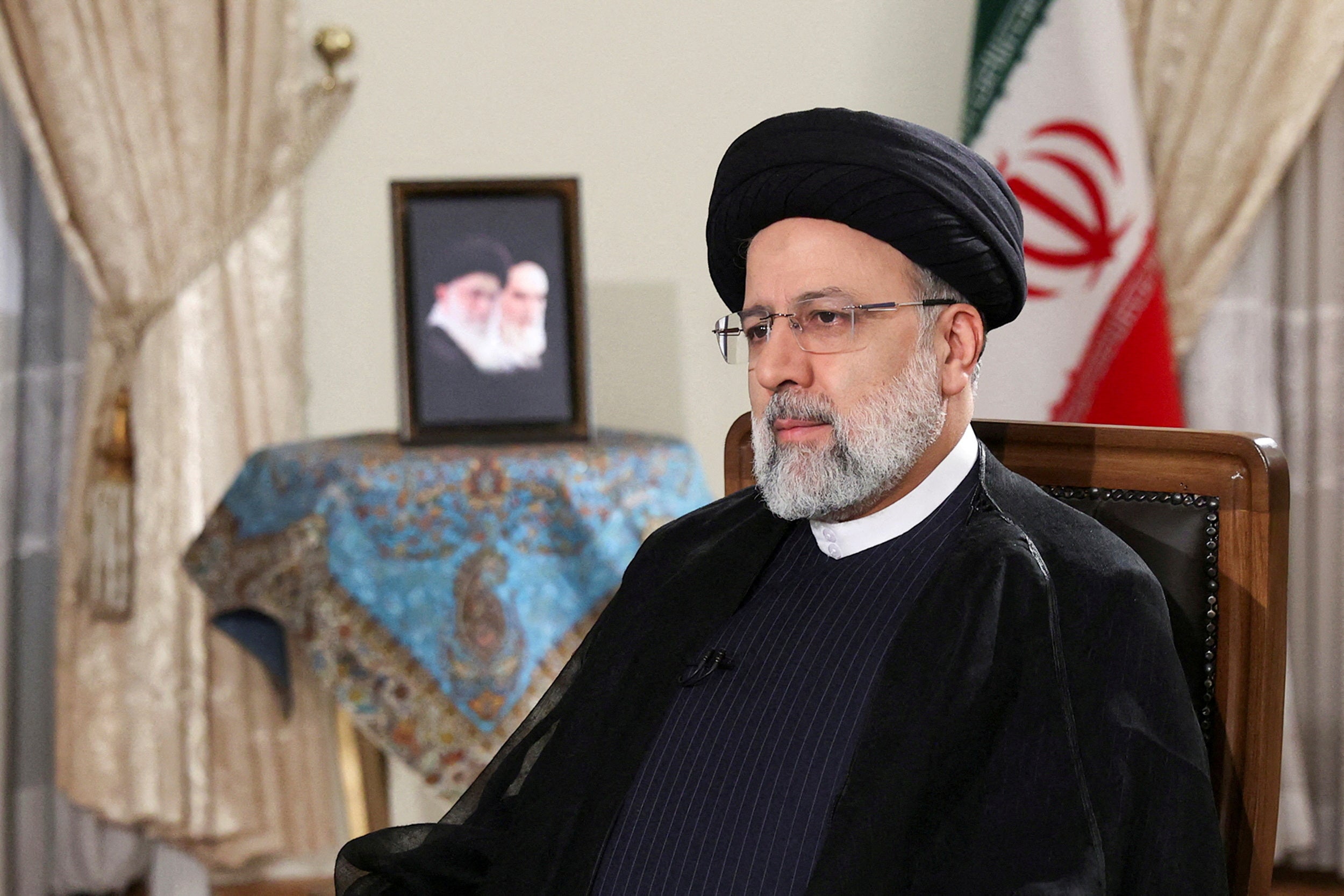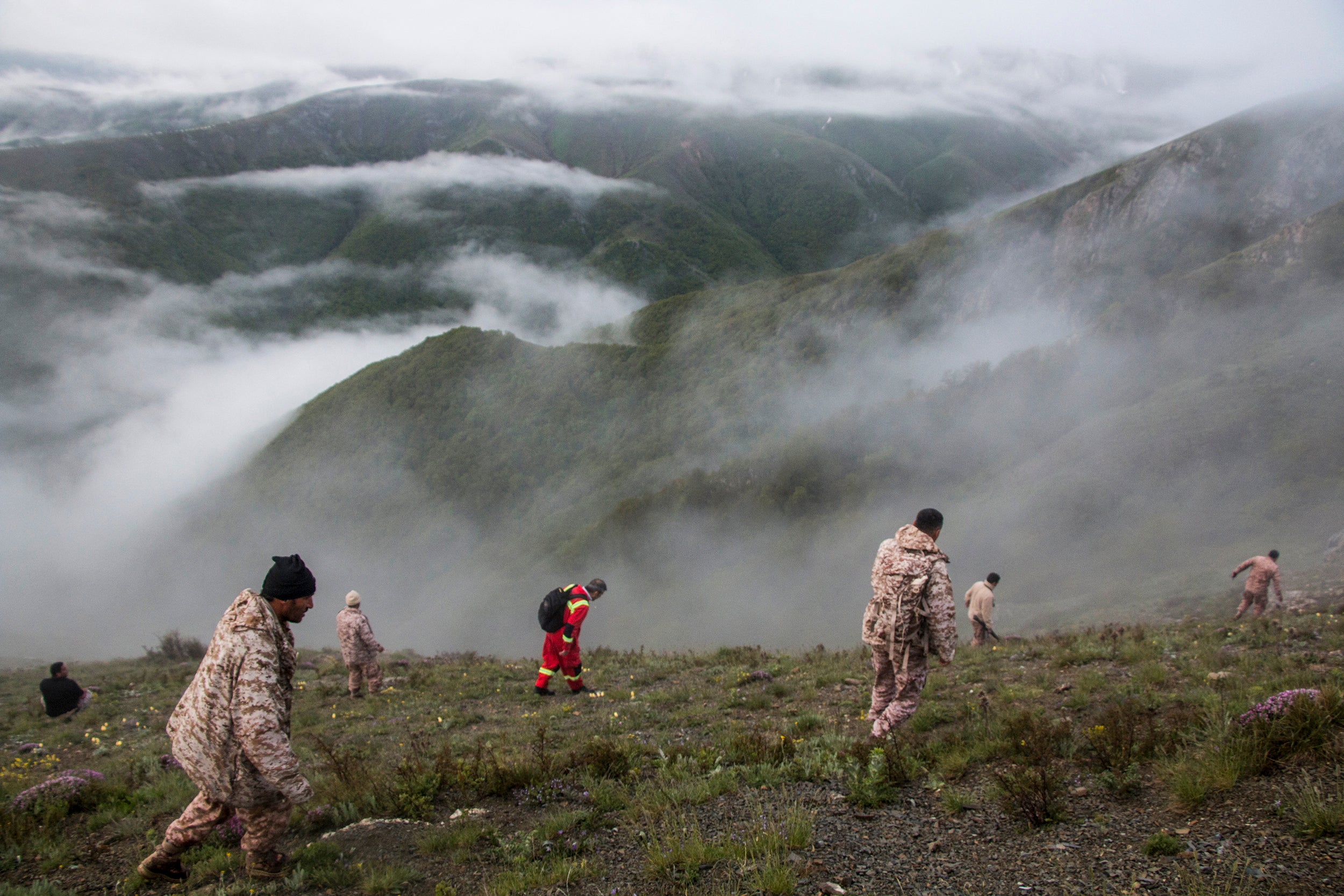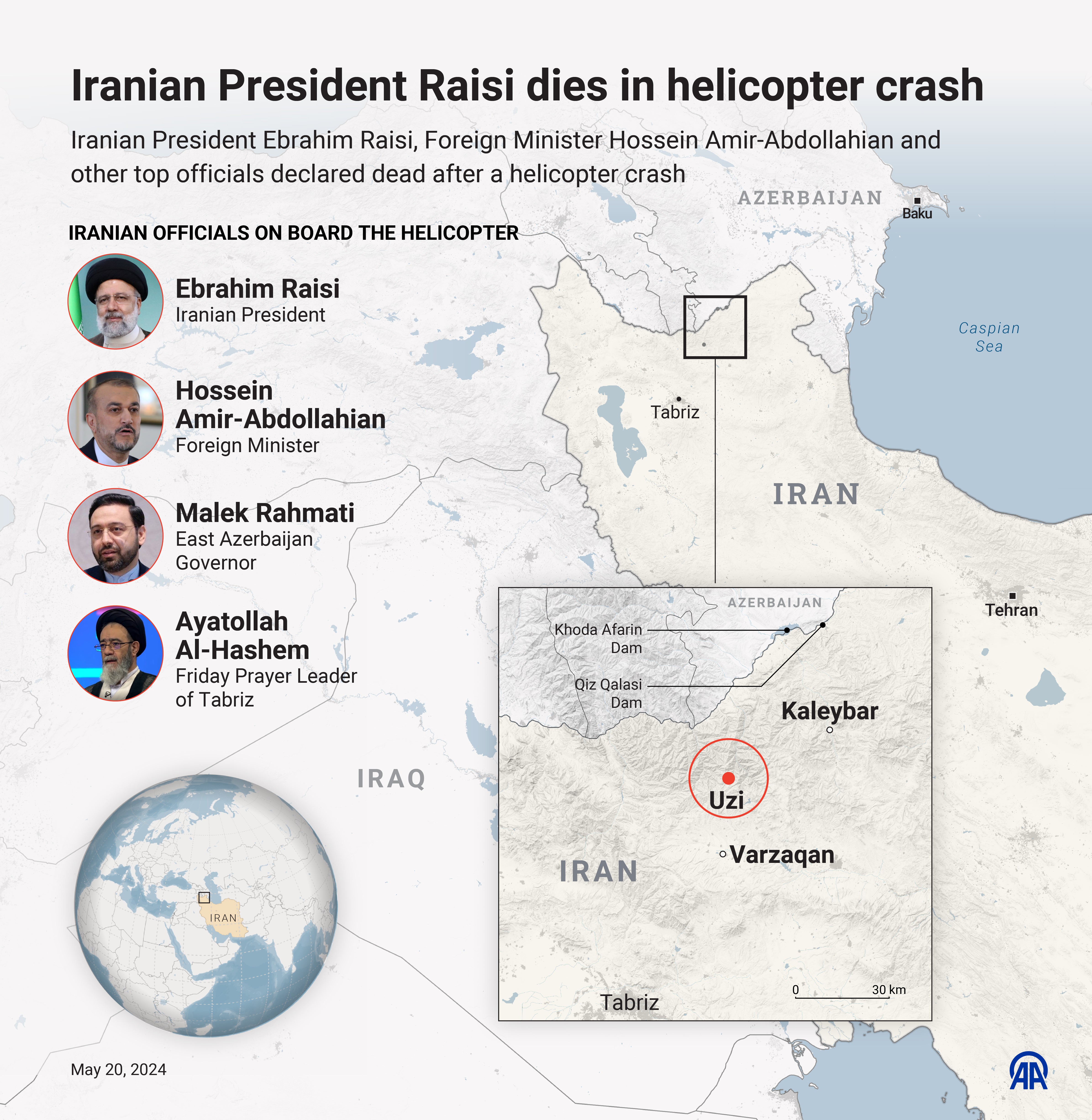
Iranian president Ebrahim Raisi has died after the helicopter he was travelling in crashed in a mountainous region of northern Iran in foggy weather conditions.
The aircraft went down in between Jolfa and Varzaqan, a region on the border of Azerbaijani exclave Nakhchivan, around 600 kilometres (375 miles) northwest of the Iranian capital Tehran.
It was carrying 63-year-old hardliner Raisi – viewed as a potential successor to supreme leader Ayatollah Ali Khamenei – and Iran’s foreign minister Hossein Amir-Abdollahian, following a visit with the Azerbaijani president to inaugurate a new dam over the Aras River, which separates Iran and Nakhchivan.

As an emergency meeting of Iran’s cabinet was conducted, Ayatollah Ali Khamenei declared five days of national mourning and announced that Iran’s first vice president Mohammad Mokhber had taken over the role of acting president, and would have 50 days to call an election.
Follow our live coverage for the latest updates
Mr Mokhber had already begun receiving calls from officials and foreign governments in Raisi’s absence, state media reported, as Iran’s cabinet vowed to follow Raisi’s path and said that, “with the help of God and the people, there will be no problem with management of the country”.
Ali Bagheri Kani, Iran’s chief nuclear negotiator, will serve as the country’s acting foreign minister, state TV said.
Earlier, an official with the rescue operation said “President Raisi’s helicopter was completely burned in the crash,” as they ruled out finding any survivors.

Raisi – who was known to many as the “Butcher of Tehran”, over his alleged role in the execution of thousands of prisoners of conscience during the purge of 1988 – was flying in a Bell 212 helicopter, according to reports.
Turkish authorities said drone footage showed a fire some 20 kilometres south of the Azerbaijan-Iranian border on the side of the mountain. Aircraft in Iran face a shortage of parts as the country has been subject to years of Western sanctions.
Up to 40 rescue teams were involved in the frantic search for Raisi which went on for hours due to fog, rain and dark, Iran’s health minister said. In the early hours of Monday, a rescue team, wearing bright jackets and head torches, huddled around a GPS device as they searched a pitch-black mountainside on foot in a blizzard.
The EU had offered its emergency satellite mapping technology in the search for the helicopter.

Experts on Iran told The Independent they did not believe much would change following the death of Raisi, with the next in line for the presidency likely to come from the hardline factions within Iran’s theocracy.
Holly Dagres, an Iranian-American analyst, non-resident fellow with the Atlantic Council’s Middle East Programmes and editor of IranSource, said that since the supreme leader Ayatollah Ali Khamenei decides all foreign and domestic policies, “there will be no considerable changes in that realm”.
“If anything, given the precarious situation on the ground, the clerical establishment will want to make this transition to a new president as smooth as possible,” she continued.
“Supreme Leader Ayatollah Ali Khamenei’s vision ... is a clerical establishment led by the relatively young and pious. He has consolidated power in all branches of government, making sure hardliners lead the judiciary, presidency, and parliament. Thus, whoever is next in line for the presidency will be from the hardline faction.”
Gissou Nia, founder and director of the Atlantic Council’s strategic litigation projects, said president Raisi’s legacy was a brutal one. She said he spent “a career oppressing the human rights of young Iranians”.
In recent years he focused his work on repressing women’s rights, she continued. In July 2022, she said he notoriously enhanced punishments for women and enforced a very draconian push to enforce mandatory hijab laws. This was just two months before the killing of Mahsa Amini in custody, an Iranian woman who was held for allegedly improperly wearing her hijab. Her death led to nationwide protests.
“After that, he doubled down and his government really tried to usher through a bill that would impose serious economic consequences for women who did not comply with mandatory hijab laws,” Ms Nia added.
“He was really the architect and enforcer of many extreme gender discriminatory policies,” she said.
Russia’s president Vladimir Putin and China’s Xi Jinping were among those to lament the loss of their “good friend” Raisi, with India and Venezuela also among those to pay their respects – while the EU’s foreign policy chief Josep Borrell and European Council president Charles Michel offered condolences to the crash victims’ families.
In an apparent rebuke to Mr Michel, Britain’s security minister Tom Tugendhat replied that he would not mourn Raisi, noting that the late Iranian president’s “regime has murdered thousands at home, and targeted people here in Britain and across Europe”.
Mr Putin swiftly held a phone call with Mr Mokhber on Monday, telling him that his late predecessor had been a reliable partner to Russia, the Russian state RIA news agency reported.

Indian prime minister Narendra Modi said he was “deeply saddened and shocked by the tragic demise” of Raisi, adding: “His contribution to strengthening the India-Iran bilateral relationship will always be remembered. My heartfelt condolences to his family and the people of Iran. India stands with Iran in this time of sorrow.”
Venezuelan president Nicolas Maduro said Raisi was an “unconditional friend” of Venezuela. “A heartfelt hug from the Bolivarian Republic of Venezuela. You, Iran, are an example of dignity, morality and resistance,” he added.
Lebanon, Syria and Pakistan all announced periods of national mourning, with Pakistan’s prime minister extending his deepest condolences to “brotherly Iran” on behalf of himself and the Pakistani people and government.
A hardliner who formerly led Iran’s judiciary, Raisi was viewed as a protege of Iran’s supreme leader – and some analysts had suggested he could replace the 85-year-old leader after his death or resignation.
With Raisi’s death, the only other person so far suggested has been Mojtaba Khamenei, the supreme leader’s 55-year-old son. However, some have raised concerns over the position being taken only for the third time since 1979 to a family member, particularly after the Islamic Revolution overthrew the hereditary Pahlavi monarchy of the shah.
Raisi – who is sanctioned by the US for his bloody role in the 1988 purge – won Iran’s 2021 presidential election, a vote that saw the lowest turnout in the Islamic Republic’s history.
Exiled Iranian women’s rights activist Masih Alinejad said her social media feeds were “flooded with videos of the family members of those killed by the President of the Islamic Republic, celebrating his death”, which she said “will increase the pressures on the regime as it faces internal and international challenges”.
The reaction in Iran was muted in comparison with the spectacular levels of public grief which have accompanied the deaths of other senior figures over the Islamic Republic’s 45-year history.
While government loyalists packed into mosques and squares to pray for Raisi and Abdollahian, most shops remained open and the authorities made little effort to interrupt ordinary life.
Additional reporting by agencies







